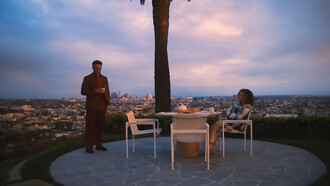South Korean filmmaker and writer Bora Lee-Kil (이길보라) has a medium length film and two long documentaries. In this latest edition of Berlinale Talents, Doc Station, she presented her new documentary project Our Bodies (우리의 몸), an intergenerational dialogue between Koreans. Who talks? With whom? About what? How and where? From the linguist's perspective they will serve as a starting point to address the project that exposes the complexity of the concepts of body and communication.
According to her profile at the Berlinale Talents, Bora Lee-Kil believes that being born and raised by deaf parents has given her the best gift to tell stories, as she shows in Glittering Hands (2015). She left school at sixteen and traveled through Southeast Asia for eight months. This experience inspired her first film, Road-Schooler (2008), which also resulted in a book. Bora studied film at the National University of Arts in Korea. She has won the Emerging Women's Culture Awards of Korea in 2015. Her recent feature film, A War of Memories (2018) received the jury's special mention for the Mecenat Award at the Busan International Film Festival in 2018. She recently graduated from the Master's program in Artistic Research and Cinema, at the Dutch Film Academy.
Bora, how do you describe the context in which your documentary Our Bodies project inserts?
The South Korean government had criminalized abortion since 1953. In April 2019, the Constitutional Court of South Korea ruled that the current criminality of abortion is incompatible with the constitution. By 2020, the Korean government must revise its laws on abortion. Nevertheless, talking about abortion is still a taboo. This film project is in between.
Which of these moments you feel are key, not only to grasp the concept of the body as a nation but to your particular topic?
I focus on how the state has trained individual bodies, especially how women’s body has been treated. When looking for historical footage, I found moments of insistence on totalitarianism, not individual identity, for the economic development of the nation. It was especially interesting when I found 'female body' on the footage. Because it's not a lot of bodies that have worked for the development of the national economy, but it's my mother's body, my grandmother's body, and my body.
Does the fact that you communicate from early childhood through sign language with your parents allows you to link the body --in a somatic sense-- closer to communication on the symbolic order of language?
It was closely related to the starting point of my artistic research Writing a history through gesture and body movement - reading the silence and memories of our bodies. The body is the first way and medium to always communicate with me. My parents have always learned something through their bodies, not books. I have learned in that way from my parents, so I decided to start my artistic research from my own body experience.
How do you feel about putting the broad matter on the table by asking about abortion?
For me, my body’s experience is the priority. That’s why I wanted to ask a very simple question to my mom, my grandmother, and the audiences. Have you ever thought about your body? What is the body for you? How was your body’s experience? Since Korea was economically developed rapidly after World War 2, there was no chance to care about our body. The government always talks about abortions, referring to population problems, but that's what happens in women's bodies, not in the population. The concept of 'population' is a later concept, and abortion and childbirth are the physical problems our bodies experience.
What kind of freedom do you feel you are getting by working on Our Bodies?
Work-in-progress version Our Bodies has a very simple construct. It consists of archives footages of Korea and interviews with my mom and grandmother filmed in the studio. I ask my mom and grandmother about the women's body and ask how each of them had experienced abortion.
The simplest may be the hardest to open up. My mother, my grandmother and I were pregnant and had abortions, but that was not possible to open up in Korean society even in my family. I couldn’t speak about it even my body came from my mother’s body and from my grandmother's body. Why? That was the starting question for this work. The simplest question is sometimes really difficult and I believe it frees us. Asking this question was difficult for me and for my grandmother and mother. But after the shooting was over, I thought something was liberated. It will be the same for mom and grandmother. The question was finally thrown into the world.















